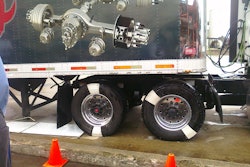Federal judges heard oral arguments presented on the cross-border trucking pilot program with Mexico Dec. 6. Meanwhile, Mexico has filed an amicus curiae brief over the program in a separate lawsuit.
The three-judge panel for the District of Columbia appeals court heard arguments against the program from the Owner-Operator Independent Driver Association and Teamsters. The Federal Motor Carrier Safety Administration presented its defense, which was not available at press time.
OOIDA stated American truckers are required to meet stricter regulations than the program’s participants and Mexico lacks a reliable system for tracking a driver’s safety and medical and substance history.
The Teamsters argued participation is insufficient to meet program requirements of statistical validity and that it is non-compliant with the National Environmental Policy Act.
Additionally, it asserted:
- The U.S. and Mexico have unequal fitness standards for commercial drivers.
- Mexico cannot provide simultaneous and comparable access for American trucks because of the nation’s limited availability of ultra-low sulfur diesel.
- American drivers are required to identify three colors while Mexican drivers have to be able only to identify red.
In the same court, OOIDA filed separate litigation regarding the National Registry of Medical Examiners after the agency’s April 20 final rule established the registry. The association argued the FMCSA is not authorized to permit Mexican drivers to operate in the United States without a current valid medical certificate issued by a registry examiner.

Mexico filed a Nov. 26 friend-of-the-court brief stating OOIDA had no basis to conclude Mexican medical examination standards and procedures are insufficient to assure appropriate safety of operation.
A previous cross-border trucking program ended in March 2009 after Congress terminated funding.
The following month, a federal appeals court dismissed litigation against the program from OOIDA, Teamsters, Sierra Club, Public Citizen, Environmental Law and Auto Truck Drivers Local No. 70. A three-judge panel wrote that the termination made it impossible rule on the program nor could it judge future program that did not yet exist.










